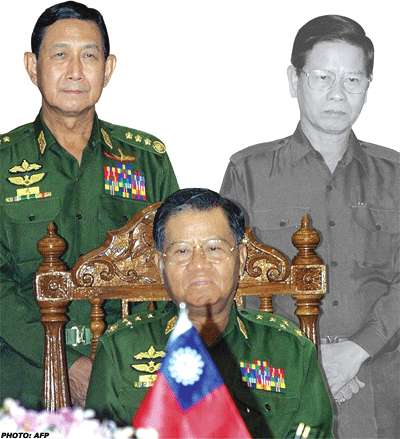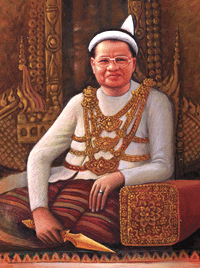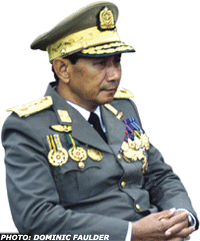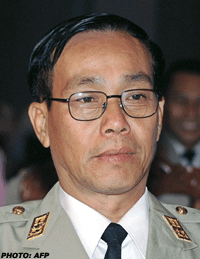
| By AUNG ZAW | OCTOBER, 2004 - VOLUME 12 NO.9 |
The purge in
The sacking of Prime Minister Gen Khin Nyunt in mid-October came as no great surprise.
As Burma’s spymaster for 20 years, Khin Nyunt finally succumbed to his rival Deputy Sr-Gen Maung Aye, who is the vice-chairman of the ruling State Peace and Development Council, or SPDC, and the army chief. Legions of officers associated with the ousted PM have been detained.

Appointed vice chairman of the ruling junta in 1992, Maung Aye is a career soldier who analysts said wanted to steer the armed forces away from politics. But, he once quipped to his close friends, “I can’t do anything because my hands are tied [by Khin Nyunt].”
Many
Junta chairman and Armed Forces Commander in Chief Than Shwe has long been engaged in a balancing act with the two strongmen, but finally sided with Maung Aye. It isn’t the first time a purge has shaken up the armed forces.
In 1983, powerful intelligence chief Brig-Gen Tin Oo (no relation to opposition leader Tin Oo) was arrested on corruption charges, and several hundred officers were forced to “retire”. His authority had grown to such an extent that he earned the tag “Number One and a Half”, a play on dictator Gen Ne Win’s nickname, “Number One”. Tin Oo’s growing intelligence empire finally convinced Ne Win to get rid of the head spook.
Similarly, Khin Nyunt’s expanding authority cramped the style of many high-powered army toughies. His workaholic tendencies and high profile allowed him to increase his influence to the point that several of
Sometimes labeled a “moderate” or a “pragmatist”, Khin Nyunt was considered among the least corrupt of
Khin Nyunt, of course, is no angel; he and his MI units were involved in the 1988 massacre against democracy protestors and he instigated the chaos that paved the way for the army to take power. He also recruited skilled and shrewd military intelligence officers into the Office of Strategic Studies, or
Likewise, individual MI officers were ubiquitous in business, running massage parlors, hotels, karaoke lounges and issuing publishing licenses in
But the “invisible government” of the MI grew too big for the army’s comfort and so was uprooted swiftly before it could overtake the entire military regime.
The End of the MI Era?
Less than a week after the purge, Gen Thura Shwe Mann, the junta’s third ranking member, told leading businessmen that Khin Nyunt was made to pay the price for “disobedience, corruption and bribery” by his military intelligence apparatus. The New Light of Myanmar reported him as saying, “In the military everybody is liable for their failure to abide by the law. Nobody is above the law.”
So what’s next now that Khin Nyunt is gone?
Reports from
A few days after the purge, the government abolished the National Intelligence Bureau, or NIB, and its existing laws. NIB controlled the MI, the police Special Branch and the investigation bureaus.
The new prime minister and Maung Aye will likely have some control over the new MI units, but Than Shwe will exercise ultimate control. The refashioned intelligence office will still be critical to the regime’s survival, and will be structured to prevent another Khin Nyunt or Brig-Gen Tin Oo from emerging.
The regime will also have to tackle several sensitive issues, like dealing with the ceasefire groups, which have expressed concern over the sudden leadership changes.
As the architect of the ceasefire agreements, Khin Nyunt maintained good relations with ethnic leaders. Already, however, new Prime Minister Lt-Gen Soe Win and Lt-Gen Thein Sein, the new Secretary-1 of the junta, have met with several ethnic ceasefire leaders in
Maung Aye’s past hostilities toward the ethnic minorities are no secret and analysts fear he will rekindle the armed conflict between the central government and the ceasefire groups. Full-scale conflict would be anathema to
It is also likely that the sacking of Khin Nyunt will have minimal impact on the constitution-drafting National Convention and the seven-point road map to political reform.
The road map, announced last August by Khin Nyunt, is actually the brainchild of Than Shwe. As it is considered the generals’ only viable exit strategy, the junta chairman will not backtrack at this point.
So where does that leave opposition leader Aung San Suu Kyi and the dialogue process?
For starters, her safety may be in jeopardy. Soe Win is believed to have engineered the deadly “Black Friday” attack against the opposition’s motorcade in
But they will have to do something with her. “Than Shwe is a smart strategist,” said a Burmese analyst in
In a display of confidence, just barely a week after the purge, Than Shwe flew to
Accompanying him on the trip were the wives of top army leaders Shwe Mann and the Commander of the Rangoon Command. Shwe Mann, Maung Aye and Soe Win, meanwhile, stayed home, prompting some skeptics to suggest that the spouses were taken to
Reaction from the Neighbors
Malaysian Foreign Minister Syed Hamid expressed concern about the leadership changes. He said: “I think it has hurt us because of the suddenness of the thing. All of us were caught by surprise.” About
So far, however, there is no indication that Asean will abandon its non-interference policy towards its members and prod
But US State Department spokesman Richard Boucher thought otherwise: “We note that the new prime minister was reportedly directly involved in the decision to carry out the brutal attack on Aung San Suu Kyi and her convoy on May 30th, 2003.”
No matter who is prime minister, Than Shwe will call the shots in
“Than Shwe understands that his country will have to enter the mainstream,” said the diplomat. “He doesn’t want
Regardless of the speculation, it’s high time for
With one down, and two to go, we will have to wait for next chapter in the power play in

Leaders’ Biographies
Senior-General Than Shwe
 As Chairman of the ruling State Peace and Development Council, or SPDC, and Commander in Chief of the Armed Forces, Than Shwe is the paramount leader of the military regime, which he has helmed since April 23, 1992.
As Chairman of the ruling State Peace and Development Council, or SPDC, and Commander in Chief of the Armed Forces, Than Shwe is the paramount leader of the military regime, which he has helmed since April 23, 1992.
He worked in the postal service before joining the army’s
After the bloody demonstrations in 1988, Than Shwe became Vice Chairman of the then ruling State Law and Order Restoration Council, or SLORC, Deputy Minister of Defense, and Army Chief of Staff. In 1990 he was promoted to general.
He planned the first National Convention to draft a new constitution, which first convened in 1993. The same year, the junta formed the Union Solidarity and Development Association, or USDA, the junta’s civilian mass organization, of which Than Shwe is patron.
We hear: Than Shwe is said to think and act like a king and is rumored to seat visitors to his home in chairs lower than his, just as the dictator Ne Win did. His family members prefer to address each other with royal titles. In a recent meeting with an Asian ambassador, he reportedly said he wanted see the end of military rule in
--------------------------------------------------
Deputy Senior-General Maung Aye
 Deputy Sr-Gen Maung Aye is the army chief and vice chairman of the junta. In 1959 he graduated from the
Deputy Sr-Gen Maung Aye is the army chief and vice chairman of the junta. In 1959 he graduated from the
He became commander of the Northeast Region in 1968, served in Infantry Battalion 68 as a lieutenant colonel and was promoted to colonel in 1979. In 1988, he became commander of the Eastern Region with the rank of brigadier-general.
Two years later he was promoted to major-general. In 1992 he was made Army Chief. In 1993 he was named lieutenant-general and the Deputy Commander in Chief of Defense Services. In 1994 he was appointed Deputy Chairman of SLORC, and now holds the same position in the SPDC.
A career soldier, he is believed to have long been at loggerheads with ex-PM Khin Nyunt. As a commander in Shan State, he forged close ties with influential businessmen such as Aung Ko Win, a.k.a. Sayar Kyaung, the chairman of Kanbawza Bank and the Billion Group.
But Maung Aye has generally been hostile toward the ethnic groups, particularly the Kachin and Karen; during a televised surrender ceremony with a battalion of Karen insurgents, he walked on the Karen flag. Karen were outraged.
Thai security advisors say that Maung Aye holds a grudge against the Thai Third Army, which is responsible for patrolling much of
Maung Aye is tipped to take over the junta if Than Shwe steps down. But some speculate that he will meet the same fate as Khin Nyunt and that Gen Thura Shwe Mann would become army chief and SPDC deputy chairman.
We hear: Aung San Suu Kyi has reportedly called Maung Aye the most charismatic of
--------------------------------------------------
Lieutenant-General Soe Win
 Before his appointment as prime minister in October, Soe Win was best known for his part in the crackdown on democracy protestors in 1988—deploying troops around
Before his appointment as prime minister in October, Soe Win was best known for his part in the crackdown on democracy protestors in 1988—deploying troops around
A graduate of the
He is a senior member of the USDA and is close to Than Shwe. The two men see eye-to-eye on “nation building projects”, which include constructing dams, roads and bridges. He is widely regarded as the mastermind behind the deadly attack against Suu Kyi and her supporters in Depayin in May 2003. The same year he accompanied Than Shwe on state visits to
A devout Buddhist, Soe Win upped the persecution against the predominantly Christian Chin when he was the Northwestern Regional Commander in
We hear: Soe Win was once quoted as saying at a local gathering of the USDA in Prome that “the SPDC not only will not talk to the NLD but also would never handover power to the NLD.”
--------------------------------------------------
General Thura Shwe Mann
Gen Thura Shwe Mann is the Defense Services Chief of Staff. He graduated from the
A year later he was promoted to lieutenant colonel and conferred the title ‘Thura’ for his bravery in action against Karen insurgents at their headquarters in Manerplaw, during his time as a regiment commander.
In 1991 he was promoted to colonel and became one of the tactical operations commanders of the Light Infantry Division, or LID, 66 based in Prome. In 1996, he was named a brigadier general and appointed as the commander of the elite LID 11, based in Htauk Kyant, 32 km west of
In 1997 he was appointed Commander of the Southwest Regional Command in Bassein. In 2000, he became a permanent member of the junta.
In 2001, he was transferred to the Ministry of Defense and named Joint-Chief of Staff of the armed forces. The following year, he was assigned to the newly created position of ‘Tatmadaw Nyi Hnying Kutkae Yay Hmu’ which authorized him to supervise the Army, Navy and Air Force commanders, the commanders of the four Bureaus of Special Operations, and the Commander of the Rangoon Command. In 2003, he was promoted to general.
Regarded as a loyal mililtary servant, Shwe Mann has earned the trust of senior and junior officers in the armed forces. Some suggest that Shwe Mann has been groomed to replace Than Shwe as Commander in Chief.
We hear: This year, Shwe Mann’s son married the daughter of prominent businessman Zaykabar Khin Shwe. At a lavish wedding party held in the Sedona Hotel, the keys to more than 50 new vehicles were presented as gifts.
--------------------------------------------------
Lieutenant-General Thein Sein
Recently appointed Secretary-1, Thein Sein was the Commander of the Triangle Regional Command in 2001, considered one of the most vital military positions. There he dealt with local drug lords in
He graduated from the
In late 2001 he was promoted to major general and appointed Adjutant-General of the War Office. A year later he was elevated in rank to lieutenant-general.
Thein Sein also heads the National Convention Convening Commission and is the Chairman of the Central Organizing Committee for